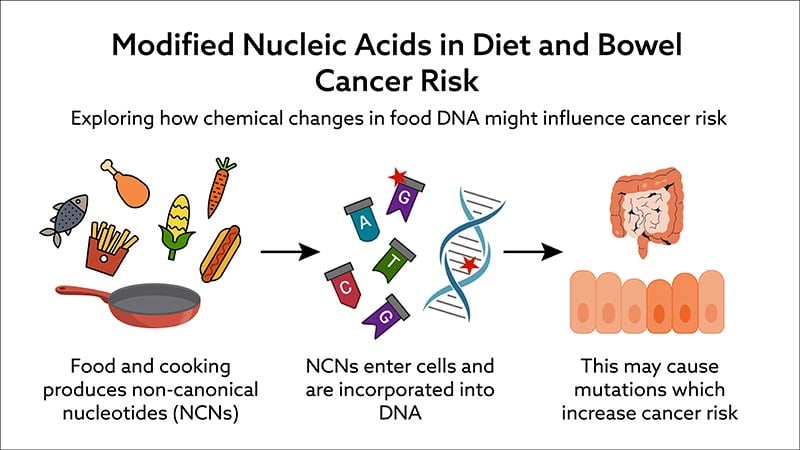Grant title: Modified nucleic acids in diet and bowel cancer risk
Institution: University of Oxford
Grant awarded: September 2025
We are grateful to World Cancer Research Fund for supporting this work. Understanding how modified DNA building blocks from our diet influence cancer risk could transform our understanding of how cancer begins, and provide ideas into how we could improve food preparation and preservation to reduce cancer incidence. With this grant, we aim to deepen our understanding of diet and help people make informed choices to reduce their risk of bowel cancer – Prof Skirmantas Kriaucionis
Background
Bowel cancer is the 3rd most frequently diagnosed cancer type, of which around half of cases are estimated to be preventable. One of the biggest contributors to the risk of bowel cancer is diet, yet why diet has such a great impact is poorly understood. This proposal aims to reveal the components of food that contribute to incidence of bowel and intestinal cancers.
The central paradigm of food digestion is that complex molecules (proteins or DNA) in the digestive tract are broken down into simple building blocks. These building blocks are then imported into our cells and used for energy production or synthesis of new complex molecules. Here we focus on the building blocks of DNA – nucleotides. DNA is composed of 4 nucleotides found in long chains (chromosomes) in a very specific order.
This arrangement is copied precisely each time a cell divides. Our previous work has shown that there are some nucleotides that are chemically different from the 4 main ones. We call these different DNA building blocks – non-canonical nucleotides (NCNs). We previously demonstrated that one of these NCNs can induce DNA damage and lead to development of intestinal polyps in mice, which can progress to cancer.
Hypothesis and objectives
We hypothesise that different food ingredients, cooking and preservation can generate NCNs, which promote the development of bowel tumours. NCNs then “tailgate” alongside unaltered nutrients, entering the cell and causing mutations, some of which can lead to cancer.
How it will be done
We will test this idea by looking for NCNs in raw and cooked foods. Then we will test how NCNs enter cells and are further processed to become precursors for the synthesis of DNA. This will narrow down the NCNs, which are likely to be detrimental, enabling us to measure if selected NCNs are capable of inducing mutations and promoting cancer formation.
Finally, we will identify which type of mutations individual NCNs produce, and which DNA sequences surround these mutations. This will allow us to compare NCN-induced mutations with mutations found in human tumour DNA. The comparison will enable us to conclude the extent to which NCN induced mutations are important in human bowel cancer, and possibly other cancers too.

Created by Prof Skirmantas Kriaucionis, University of Oxford
Potential impact
By revealing the ingredients and cooking/processing methods that generate cancer-causing NCNs, we will inform society of diets that increase the incidence of bowel and potentially other cancers. Moreover, we envision that our research will also inspire the generation of new supplements, which will reduce formation of NCNs or reduce the effects of NCNs on cancer incidence, contributing to the prevention of cancer.
